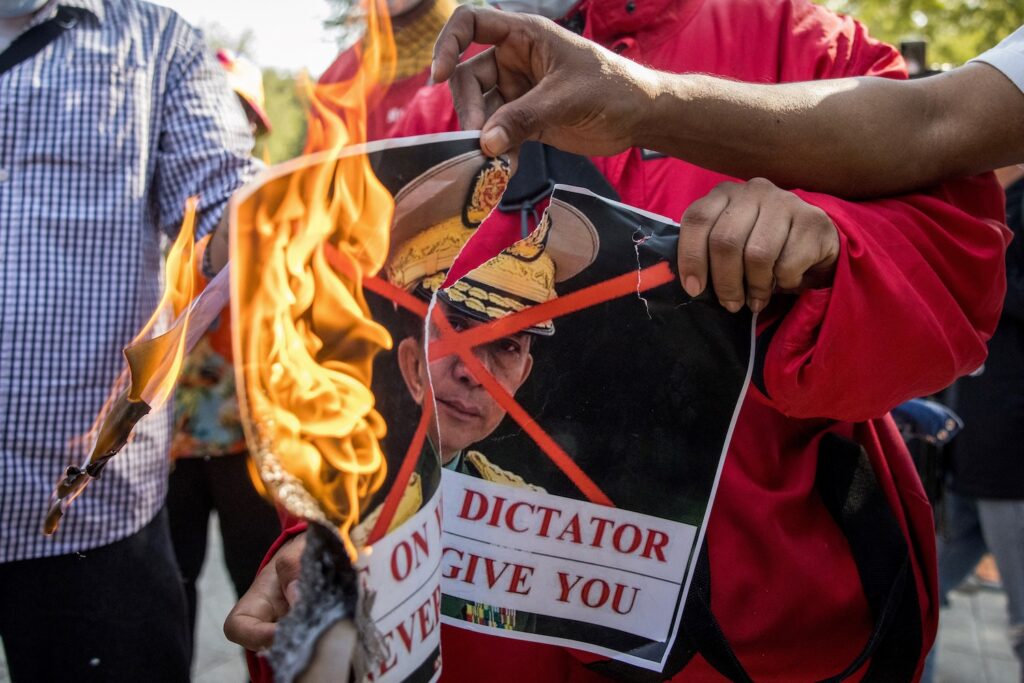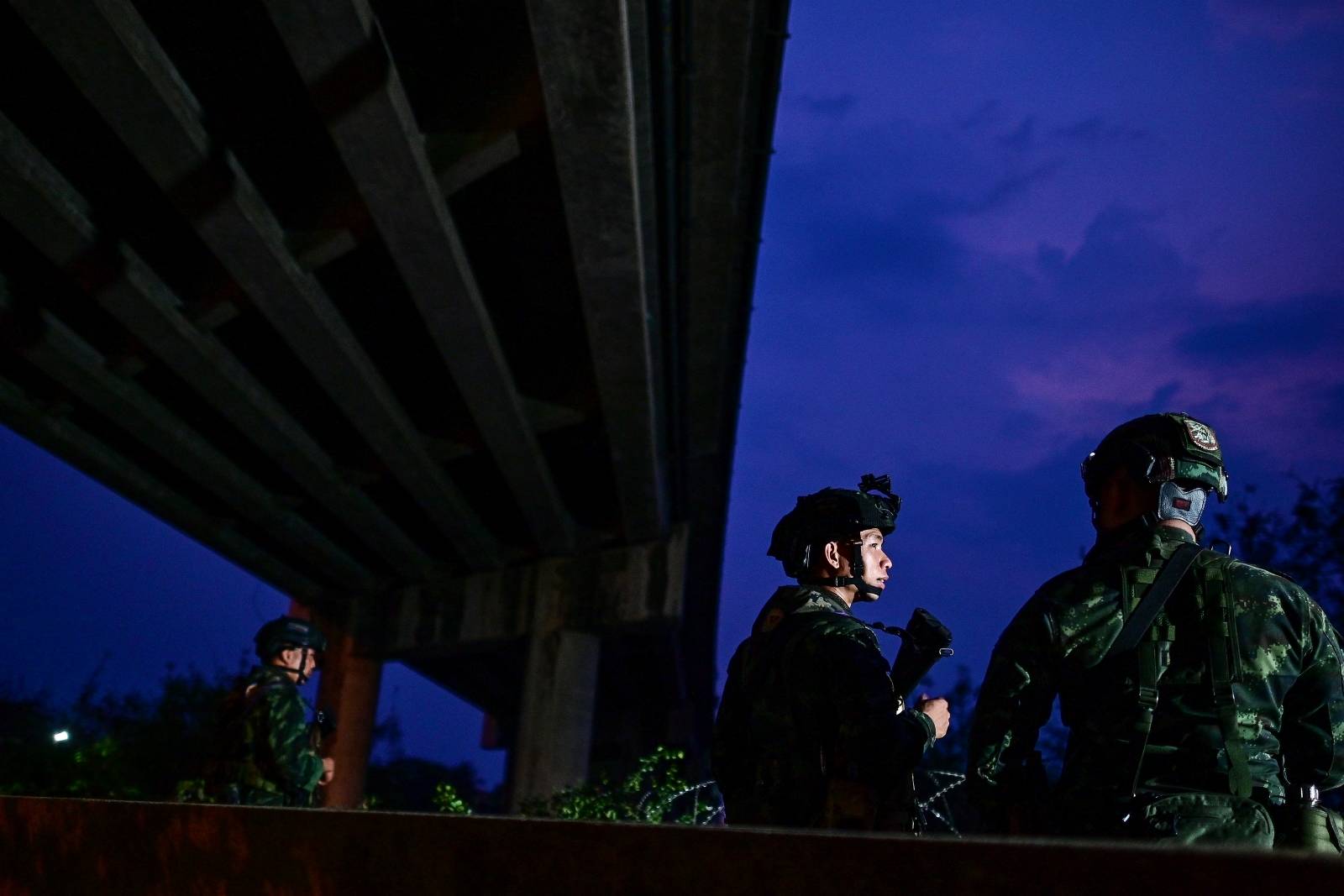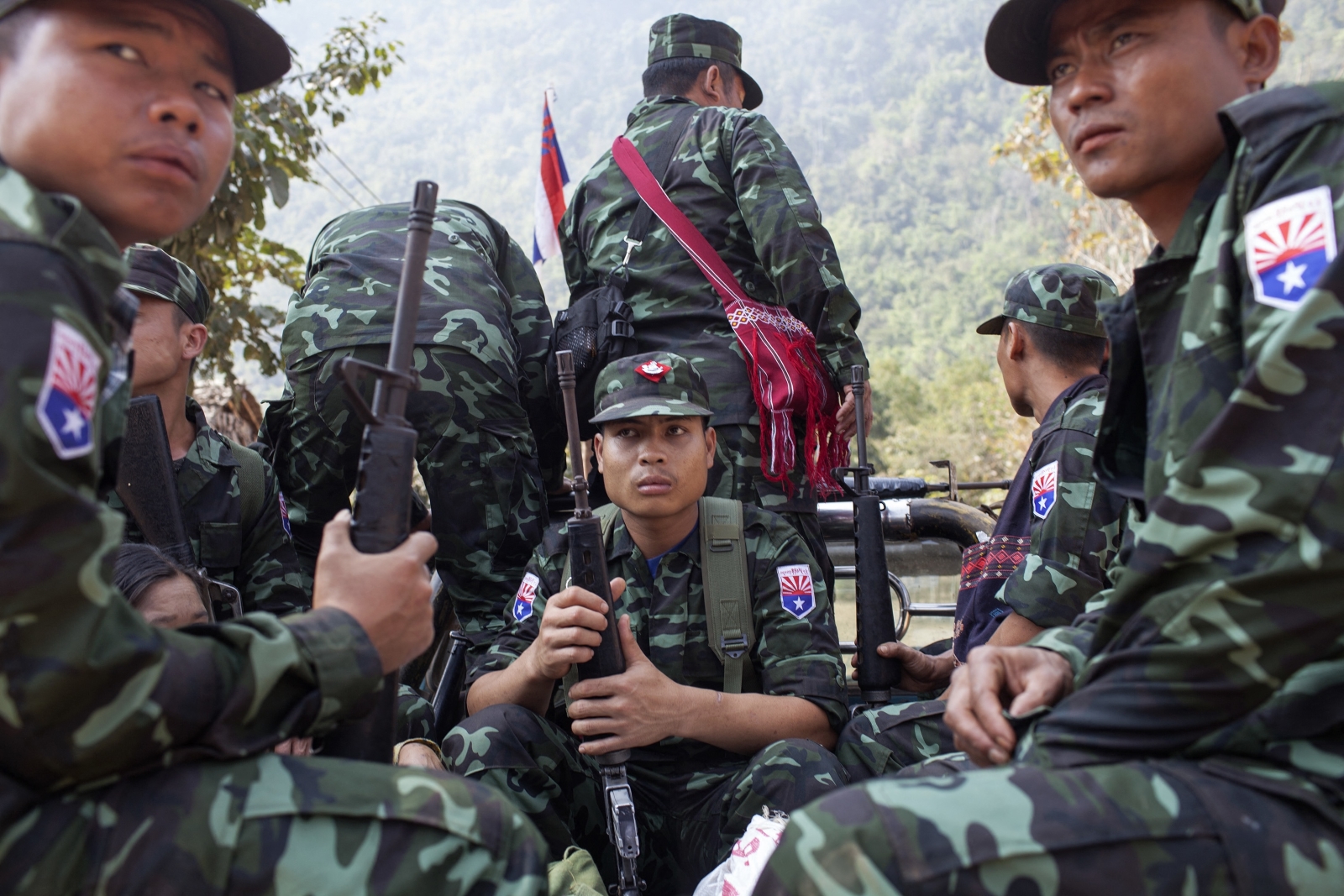International aid agencies say they need to play by the junta’s rules to serve vulnerable communities, but critics say they’re legitimising the regime for limited gain and ignoring informal channels.
By FRONTIER
It’s been more than two months since Ko Nay Min* fled with his wife, mother and 10 and 12-year-old sons from their village in Sagaing Region in Myanmar’s central Dry Zone. They still don’t know when, or even if, they’ll be able to return home. More than 90 percent of his village – about 900 people – are now sheltering at nearby monasteries. They are among the almost 700,000 people who have been displaced in Sagaing since the coup.
Many of those displaced have lost their homes in military arson attacks or are fearful of soldiers and junta-backed Pyusawhti militias that continue to arrest, torture and kill civilians. In Sagaing alone, at least 1,512 civilians had been killed as of September, and as of late October, more than 26,000 houses had been torched – the most out of any state or region in the country, according to the Institute for Strategy and Policy-Myanmar.
While staggering, these statistics don’t begin to encompass the difficulties facing those affected by the violence.
“Displaced people in Sagaing are deprived of their human rights. Some are suffering from illnesses and infectious skin diseases due to bad hygiene, and some have had to cut down trees in forests to build tents to live in,” Nay Min told Frontier. “Since we ran away, we’ve had no work or income. Many of the elders shed tears because they want to go back to their homes but they can’t.”
But despite the immense needs, many communities in Sagaing have been left to fend for themselves with little or no outside help.
“No aid from international organisations has arrived yet,” said Nay Min. “The only help we get is from people in surrounding villages and the donations are very small. There aren’t even any health clinics nearby and displaced people are scared to go to the hospital because the junta’s security forces might arrest them.”
The February 2021 military coup has radically shifted the humanitarian aid landscape in Myanmar. While authorities have always imposed limits on external aid, particularly in conflict areas, international agencies are now unable to meet people’s most basic needs in many areas because of active fighting and insecurity, but also obstruction by the junta, officially known as the State Administration Council.
While some organisations have shifted to funnelling assistance over the country’s land borders and via informal networks, others continue to operate within the confines of military rule. Critics say these organisations, which include United Nations agencies, are ignoring opportunities to ramp up cross-border aid and are legitimating the regime, while also allowing it to use the granting and withholding of aid to punish its enemies and reward supportive communities.
Those working within the system, meanwhile, reject that they are conferring legitimacy and say that substantial cross-border assistance cannot realistically reach many of the worst-affected areas. A minimal degree of engagement with the junta and compliance with its rules, they argue, is a necessary evil if communities are not to be left behind.
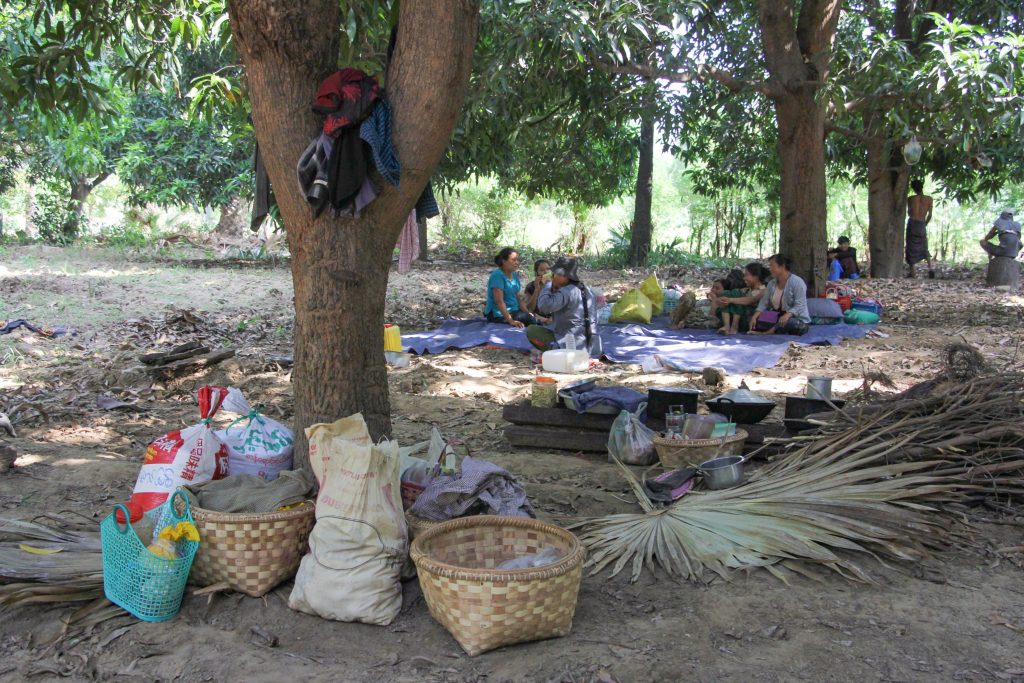
‘We could be arrested’
Even for organisations that have a Memorandum of Understanding with the regime – operational documents that require a level of engagement with the junta and are often difficult to obtain – there are still considerable restrictions.
To access communities, they must apply for travel authorisation. The permits, which require organisations to submit full travel itineraries and detailed information on the aid being delivered and the staff responsible, allow workers to pass through military checkpoints and operate in the field. While authorisation was required to travel to many townships before the coup, the issuance of permits has slowed considerably and in some areas, especially where there is active conflict, authorisation has been stopped completely.
While the regime’s presence is receding in many rural parts of the country, it is still able to block aid convoys due to its full or partial control of major highways and transport hubs. Mr James Matthews*, a humanitarian aid worker, claimed this is the case even in Rakhine State and neighbouring Paletwa Township in Chin State where ethnic armed group the Arakan Army has gained considerable ground.
“Most of Rakhine is mixed control. All movements can be challenged by the SAC because they still have strong presence and are able to move resources and troops across Rakhine,” he said. “If you really look at what territory is fully controlled by resistance groups it’s not a big area. Most of the territory where the junta is no longer in control does not mean that the territory is fully controlled by any actor. In turn, this does not create sufficient circumstances for safe humanitarian operations.”
On September 15, following renewed fighting between the military and AA, the junta issued a directive banning all international organisations from six of the most conflict-stricken townships in north and central Rakhine.
Daw Khine Khine Zan*, an aid worker in Rakhine, said there was a military rationale to the ban. “The junta is trying to block aid in Rakhine because it is worried that it will reach the Arakan Army,” she told Frontier, adding, “If the military restricts travel, there is no way around it. Since we could be arrested, we have stopped all of our activities. Both national and international NGOs have stopped delivering aid.”
Late last month, the junta enacted a new Organization Registration Law that, contrary to its predecessor, requires both international and domestic groups to register with the regime and comply with a stricter set of measures. It bans contact with “unlawful or terrorist organisations”, “crusading” for any religious cause and campaigning for a political party, and violations carry a maximum five-year prison sentence.
“Criminalising those who do not register may cause organisations to cease operations as they do not want to legitimise the regime or bring their activities in line with what it would sanction,” said Mr Carlos Wright*, an aid worker in Yangon.
He told Frontier the “draconian law” will “further limit an already very restrictive humanitarian environment in Myanmar, with the many people living through widespread conflict and economic strife bearing the brunt.”
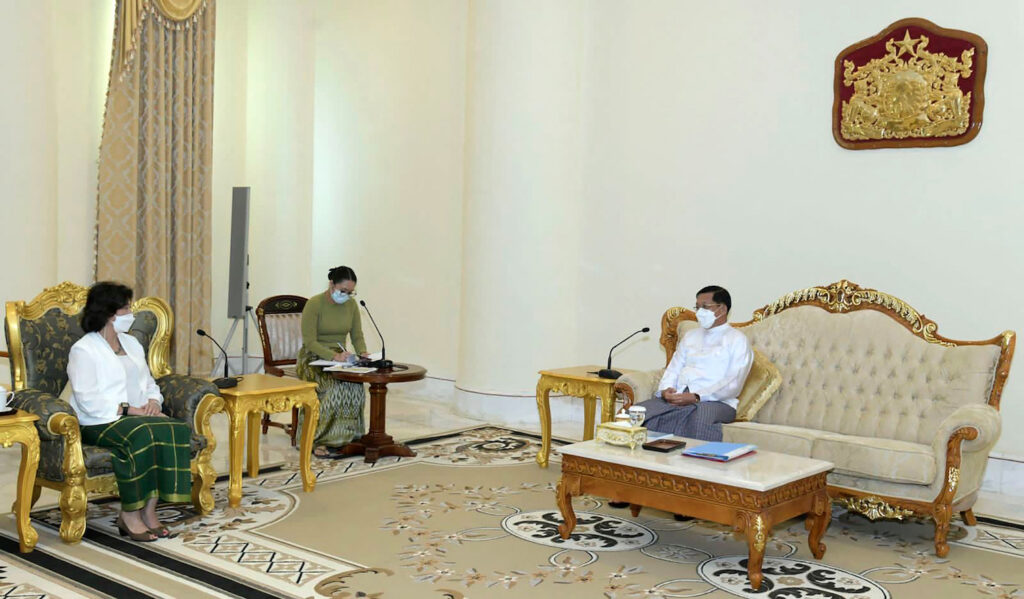
Ends and means
To ensure the access they still have amid these constraints, some international agencies have maintained a level of engagement with junta officials, prompting public outrage.
In the last year, there have been at least eight publicised meetings between high-level UN representatives from five different agencies and junta officials. The UN Children’s Fund country representative Mr Marcoluigi Corsi and the UN Food and Agriculture Organization representative Dr Yuka Makino presented their credentials to the regime’s Minister of Foreign Affairs U Wunna Maung Lwin in July and August respectively. Officials from the UN’s High Commissioner for Refugees and the Office for the Coordination of Humanitarian Affairs have also signed MoUs and letters of agreement with the junta.
UN agencies are not the only ones meeting with the regime. In June last year, the President of the International Committee of the Red Cross, Mr Peter Maurer, flew to Myanmar and met with junta chief Senior General Min Aung Hlaing to share “concerns on the current humanitarian aid situation”. The ICRC in Myanmar did not respond to Frontier’s numerous requests for comment.
Many Myanmar people have condemned these meetings and accused the agencies of playing into the junta’s hands. The UN’s operational mandate in each country, which differs from NGOs, requires consent from the “host government” and the UN Manual of Protocol recommends that its representatives present their credentials to the head of state or government or to the foreign minister.
However, many say the UN and other international agencies should not be treating the junta as if it were the legitimate government, given it seized power illegally and has no representation at the UN. Despite regular appeals, no UN official has presented their credentials to the National Unity Government, a parallel administration appointed by elected lawmakers deposed by coup.
The UN in Myanmar told Frontier that “engagement with the de facto authorities does not confer legitimacy” and sources familiar with its operations said it comes down to who is in control of certain key levers of the state. For instance, foreign aid workers need a junta-issued visa before they can work in the country.
Matthews said that, additionally, engaging the NUG may only endanger their operations. “At present, signing agreements with the NUG does not offer an ability to expand humanitarian access. Rather, it creates safety and security risks. If you sign an agreement with the NUG and it leaks to the public or SAC, your operation will likely end up being shut down with your staff in jail – that’s the outcome.
“[Meeting with the junta] is not recognition – it’s navigating a relationship with an actor who has a monopoly on violence,” he said.
This concern has been heightened by the junta’s attacks on health workers, despite this being a violation of international law. As of March this year, it had arrested 564 medics and killed 36, according to Insecurity Insight. In mid-September, the bodies of four missing aid workers from a domestic NGO were discovered in Sagaing.
An international aid worker who asked to remain completely anonymous said his organisation keeps its contact with the regime to an “absolute minimum”, and only to a level required to obtain documentation and continue operating while keeping its staff safe.
“If [international organisations] meet the junta to get their MoU to continue providing aid, then it might be necessary for them to grin and bear it while [the regime gets] a PR moment and then to wait for the news cycle to move on,” said Wright.
“As long as there is a clear impact on communities from the presence of these international actors, then I think there is some justification for [engaging the regime], but I totally get the huge frustration that the people of Myanmar may feel when they see them sign these agreements with the junta.”
However, others dispute that these trade-offs are delivering a “clear impact” for communities. Mr Duncan McArthur, the Myanmar programme director at The Border Consortium, said that despite jumping through the junta’s administrative hoops and engaging it formally, the UN in particular “doesn’t seem to have much access at all”. He pointed to a report by UNOCHA covering the year to June that revealed that 81pc of all UN food assistance went to communities in Rakhine and peri-urban Yangon, although at the time they accounted for only about 17pc of the country’s displaced population.
McArthur called this a “damning statistic”. “It goes without saying that the most urgent needs are in the rural areas where the Myanmar armed forces are targeting ethnic minorities. The humanitarian response from the formal humanitarian architecture isn’t reaching where the needs are most acute,” he said.
Dr Min Thu Aung*, a medical doctor in Kayah State who left his government job to join the Civil Disobedience Movement after the coup, said he has also yet to see any benefit in his home state from meetings between international organisations and the junta.
“As far as I’ve seen, there is absolutely no help from international organisations for displaced people [in Kayah] since the coup,” he said, adding that local people would anyhow be reluctant to accept aid that was delivered under junta supervision. “Many of these international organisations seem to be cooperating with the military council. They can do so but we will boycott them,” he said.
Sources in neighbouring Kayin State, where fighting has similarly displaced hundreds of thousands of people since the coup, paint a similar picture. Saw Lay Ka Paw, spokesperson for the Karen Peace Support Network, a civil society group, said the work of many international organisations like the UN seems to “only exist on paper” and is “contrary to the people’s desires”.
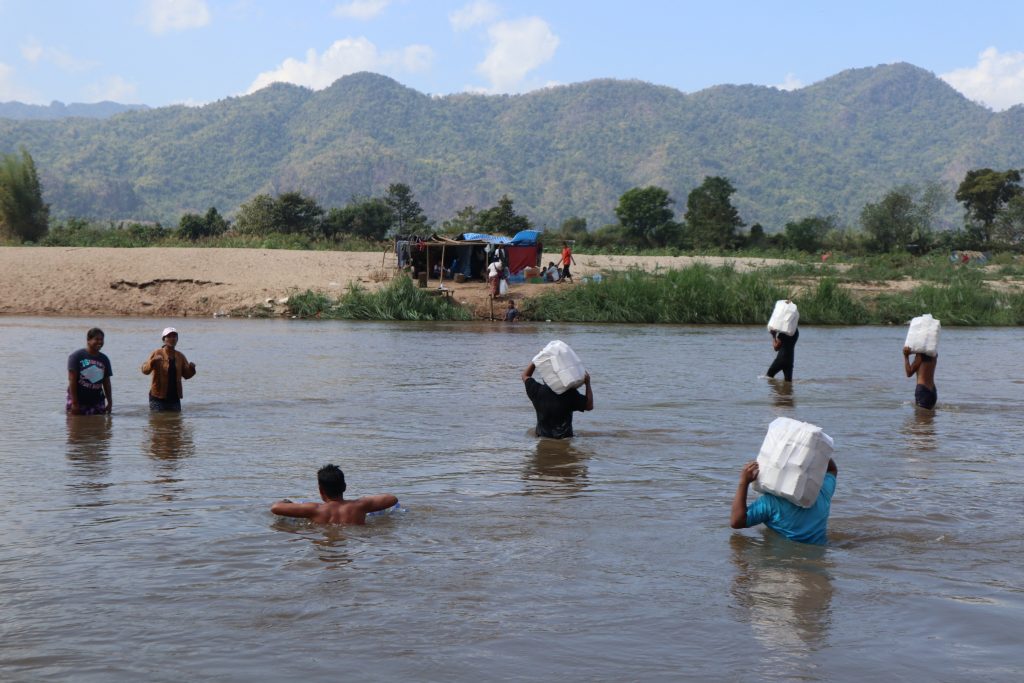
‘Displaced people do not want aid from the SAC’
Some aid groups have turned to cross-border channels as a way of circumventing the junta’s restrictions, denying it any legitimacy and getting assistance to areas the junta may be intent on depriving.
Cross-border aid usually involves international organisations linking up with local actors to deliver outside assistance to communities in border regions. In Myanmar, this is a tried and tested method of helping those along the Thai border, especially in southeastern Kayin, Kayah and Mon states, where humanitarian crises existed long before the coup and local aid networks are well established.
“Almost all aid into Karen [Kayin] State to help displaced persons fleeing the war is coming across the Thai border,” said Lay Ka Paw. “The Border Consortium is supporting the needs of Karen displaced people but other international organisations in the state are almost non-existent.”
However, it is considerably more challenging to move cross-border aid to places that are further inland such as Sagaing and Magway, which don’t have comparable aid networks and where the junta can block access along major transport routes.
“What you can do with cross border aid is basically service areas that are fully or near-fully under the control of resistance groups and that can be entered by crossing other countries’ boundaries. It has a really restricted geographic scope. Sagaing and Magway – you can’t reach these places with cross-border dynamics,” said Matthews.
Although Sagaing shares a large border with India, the neighbouring Indian states are highly militarised and partly restricted to outside groups. These factors contribute to a lack of aid agencies capable of channelling aid across the border.
Matthews said there has been some aid passing from Mizoram into Chin State, thanks to strong cross-border ethnic ties and the leniency of the Mizoram state government. However, further north in Manipur state, which borders Sagaing, there has been a very limited response.
The situation is also bleak for communities in Myanmar’s northeastern Kachin and Shan states that border China, where conditions are also inhospitable for crossborder aid. Frontier could not confirm any instances of international assistance moving across the China-Myanmar border.
Beyond the geographical limitations, reaching communities that do not have pre-existing aid networks also poses a funding challenge. Aid worker Mr Chris Anderson* said local organisations in places like Sagaing and Magway “take a different form – more dynamic, more network based. A donor might not see things that are very recognisable; [these groups] might not have a board of directors or a constitution. So, there’s more reluctance to provide direct funding to these organisations,” he said.
Only a handful of agencies are currently doing cross-border aid, and these largely established their networks long before the coup. McArthur estimates that about 90pc of aid from foreign governments in Myanmar is still going through formal channels and only 10pc through informal means, although Frontier could not independently confirm these figures. Several aid workers told Frontier that there has been a lack of effort from larger NGOs and UN agencies to shift gears and establish closer relationships with local aid partners.
“Most are either unwilling or don’t have the connections,” said Anderson, who also blamed “the parachute model of foreign staff who have very little institutional long-term understanding of the conflict. They’re also not given the flexibility to respond in a dynamic and adaptable way to the changing situation because of procedures and bureaucracy.”
However, even with its challenges, cross-border channels offer one of the only ways of transferring money, food and other kinds of aid into Myanmar without inadvertently bolstering the regime or bowing to its increasingly restrictive rules.
“You have to assess – what are the alternatives?” said Anderson. “I have yet to see any evidence that the SAC will ever be a genuine interlocutor in terms of humanitarian aid delivery. If you simplify it, the SAC is the one displacing people so the idea that they will then facilitate or support aid in a genuine, fair way is ludicrous. And displaced people do not want aid from the SAC. If that’s your alternative, then your only real option is to work through cross-border aid with these local agencies and networks.”
* The names and affiliations of some sources have been withheld to protect their identities or due to the sensitivity of their work.
Correction: An earlier version of this article incorrectly calculated the percentage of Myanmar’s displaced population that are in Rakhine State and peri-urban Yangon, without factoring in pre-coup displacement.


